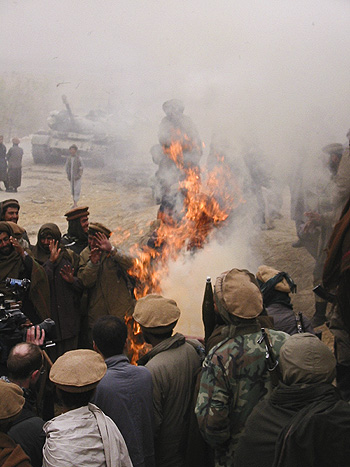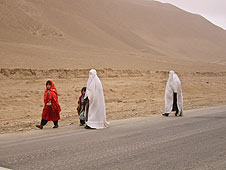
November, 2001. Afghan fighters try to keep warm on the Kunduz front.
Photo: Phillip Robertson
During one particularly intense stampede, a Portuguese journalist named Daniel pulled me into a giant truck and drove me halfway out of town. The rest of the morning we spent walking the streets of Kunduz, being pulled down streets by throngs of people who were trying to show us things, who couldn't explain in English or Russian, but we couldn't go with them because we were afraid of running into hiding Taliban fighters in the side streets. Children held up Russian copy books for us to inspect. A beggar stroked my beard and asked me how I was. A 19-year-old English teacher tried to bring us to his house for tea. Taliban snipers shot at Westerners all morning and missed.
By 10 the city was calm and I trudged around looking for Amin so I could call the BBC and do a radio interview with the satellite phone. When he reappeared, I climbed into the jeep, looked up the number and gave them an incoherent 40 second interview about the situation in Kunduz on the day it fell to the Northern Alliance.
After we got back to the guest house, Sion fell dead asleep with a very high fever. I paid Nazar and Amin, and told them to take the next day off.
Yuri Kozyrev, our house mate, a photographer who was working for the Los Angeles Times, came early the next day and woke me up. He told me, after I followed him out into the garden, that we had to leave immediately because another journalist had been killed, this time in Taloqan, by masked gunmen who robbed a Swedish crew and shot their cameraman in cold blood. It was quite some time before we heard all the details of the killing, but at that moment, we were concentrating on how to move as fast as we could to a safe location.
We should go somewhere together, I think, Yuri said. I was all for that, and went in to wake up Sion. Soon, our host Atiq was sniffing around trying to understand why we were packing so quickly. As we got the gear into Yuri's car, Atiq came up to me and asked, "Mister, where are you going?"
I wouldn't tell him, but the idea was that we would go and ask for the protection of a local warlord named Mutalab Bek, and possibly stay at his house for the night, a heavily guarded compound. When Sion was ready, we piled into the cab and drove off to the foreign ministry, where we found almost all of our colleagues lining up to get out of the country. The convoy took up the whole block. In the back of a pickup was Ulf Stromberg's body.
We arrived at Mutalab Bek's place, a two-story concrete palace, and spent hours trying to figure out what to do next. Yuri was going to Mazar-e-Sharif with a writer for the Los Angeles Times, and they were going to take a really long route. He wanted to know my plans. Sion was definitely getting out the following morning and was trying to talk me into leaving, but I couldn't decide yet. I counted people and there were only 15 of us left in Taloqan that night, everybody having moved into the guarded compound.
Upstairs, Jeanette, a French Canadian, produced the first cheese we had seen in a month and asked if we were hungry. In her room, she had an incredible stash of wine and crackers and some other high- grade non-Muslim contraband. It was so civilized we almost wept. She poured me out a healthy shot of Glenfiddich and gave us little presents of food. Sitting at her table, thinking about Ulf Stromberg, I decided to leave Afghanistan on the next convoy, early the next morning, but it made me feel sick and ashamed.
The previous night, Nov. 26, Stromberg and the other Sweden TV4 people were resting at their guest house when a group of masked men burst in and started demanding dollars, more dollars. They rummaged around in the bags of the Swedish crew, gathering up satellite phones, computers and $3,500 in cash, and when Ulf opened a door, one of the gunmen shot him in the chest. His friends called a heart specialist in Sweden who carefully explained how to keep pressure on the wound, and they brought him down to a pickup truck and drove him as fast as they could to the hospital in Taloqan. Stromberg bled to death before they could get him there.
He had offered no resistance to the gunmen.
Down the hall, Justin Huggler was filing a story on the cameraman's death with his copy department at the Independent, reading his article over the phone. When he read his piece, we all stopped and listened with bowed heads, because it was a eulogy and so bitterly sad, this death of Ulf Stromberg, an event so needless and at the same time lost in the sea of the other deaths in Afghanistan. We walked around Mutalab Bek's protection-money palace in a daze. Bill and Jeanette made a few calls and found us a driver and a fixer for the trip to the border via Dashte Kala. We told them to be out front at 6. It would cost each of us about $500 to leave the country. We heard that the convoy leaving for Dushanbe via Dashte Kala was leaving from the CBS compound, so the next morning, after jumping out of our sleeping bags, and into our clothes, we hook up with the driver and head over to CBS with Bill and Jeanette coming in a separate car. After a few minutes, Sion comes up and says, "Do you know where this convoy is going?"
"Yes, dude, it's going to Dushanbe."
"Well, I just heard an Afghan guy say it was going to Kabul."
"Oh Jesus."
We tore out of there for the foreign ministry where we hoped to catch the right convoy out of town. As we drove down Taloqan's main street, Sion saw the Sky News jeep headed west going in the exact opposite direction. We turned around, following them and finally lost their jeep in a cloud of dust.
"Could you speed up?" we asked the driver.
The fixer told me that he didn't like the dust, which is why we were so far behind him.
"Just catch up to him."
Ironically, this ride was the most uncertain ride of all, as we left town without armed
escort, with no one else on the road in clouds of billowing powder. I waited for the
Taliban to come sprinting out of the hills. It never happened. At one point, a Jeep with
dark windows seemed to follow us for a while, shattering our nerves, but that was all.
Sion was totally calm, while our fixer chatted away in Russian. Bactrian camels drifted
across the road. We saw caves cut in sheer cliffs, and when we made it to the first river,
in territory that had never been held by the Taliban, I felt that we were out of the
woods. When we forded it, the water came up past the doors of the jeep, and the driver
floated us across. After a six-hour drive, we were at the ferry crossing of the Amu Darya
River and out of the country.![]()
 LEAD IMAGE: 20 November, 2001. Refugees on the road before the fall of Kunduz to the Northern Alliance.
LEAD IMAGE: 20 November, 2001. Refugees on the road before the fall of Kunduz to the Northern Alliance.Photo: Phillip Robertson
To contribute or commission a new Afghanistan assignment, click here.
© Phillip Robertson, 2009-2014.
